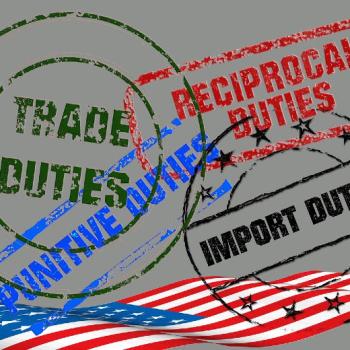TheyThe big news this weekend has continued to be President Trump’s tariffs and his flip-flop on them. He continues to push his tariffs on the world like a political bully, even on our closest allies.
The worldwide fallout has created an unstable world economy, with the cost of everything from basic needs to electronics skyrocketing. As I write this the president has announced a temporary hold on electronic device tariffs. Perhaps the president remembered his pledge to lower prices for Americans on day one after all.

There’s been a lot of controversy in recent weeks over tariffs and who actually pays them. The purpose of any business is to turn a profit and if a business’ expenses increase, they must pass the buck on to compensate for their losses:
- Customers
- Retailers
- Labor
In the end nobody really wins, it’s just a display of political and economic power. The president’s “Reciprocal” tariffs are a type of revenge that is a childish tit-for-tat action that contradicts everything God and Jesus taught His people (Leviticus 19:18, Judges 16:24-25, Proverbs 20:22, Matthew 5:38-39).
Recently the president seems to even contradict himself more and more, a little over a week ago he declared that he “knows what he is doing with the economy.” The president continues to flip-flop on his own tariff policies, pausing or excluding items from tariffs whenever he feels it will benefit his poll numbers.
President Trump is notorious for his many bankruptcies and business failures. I may not be the richest or smartest man in the world, but even I can tell the president makes poor judgments in regard to business and money.
God promised to give His people judges to help them be different from the greedy and corrupt world (judges 2:16-19).
What Are Judges
Most of us are familiar with judges from a legal perspective, but judges have more roles outside of the courtroom as well. From sports to game shows, judges are used to make important decisions. A judge is defined as, who “One makes judgments or someone with an authoritative opinion; umpire.”

Judges are normally well-educated in the law or a specific area of expertise. They are also unbiased and don’t benefit from the outcome of their decisions. Human judges are imperfect because of their sinful natures.
Since judges hold a degree of power and a unique purpose, the Bible has a lot to say about judges and who is the ultimate Judge of all (Acts 17:11, Hebrews 12:22-24, James 4:12). Only God is just and His laws are perfect (Acts 5:29, Romans 12:19, two Thessalonians 1:6-8).
God judges everyone by His standards, not ours (Romans 11:33, 2 Timothy 4:1-2, 2 Peter 1-22). The apostles remembered their Jewish education about judges.
Šāp̄aṭ
The ancient world was full of corruption and evil that eventually became so out of hand that God regretted making man (Genesis 6:5-6). Judges became a popular way to bring justice, not revenge.
They were a lot more than just lawgivers. Judges were powerful leaders and advisers to rulers over nations. The Hebrew word in the Old Testament for judge is šāp̄aṭ and it can also mean, “governor a ruler”, depending on the context it is used in.
. Israel rejected God as their Judge and King and asked God to raise up judges to help bring justice and greatness to them (Judges 2:16-18; 3:9-15; 4:4-5; 10:15, 1 Samuel 8:5-6). These are the judges who ruled Israel before kings:
- Othaniel
- Ehud
- Shamgar
- Deborah
- Gideon
- Tola
- Jair
- Jephthah
- . Ibzan
- Elon
- Abdon
- Samson
Jewish prophecy predicts the Messiah would be a great and just judge (Psalm 72, Isaiah 11:3-4, Micah 5:1). In Judaism, judges were often military leaders; this is why the Messiah is often thought of as a great military leader.
This is also why most Jewish people reject Jesus as the Messiah; He wasn’t a mighty military leader on his first visit to earth. The New Testament writers often identify Jesus as a judge who will judge the world and God’s people (John 5:22-25; 7:24).

Jesus often taught un the synagogues and debated the religious experts of the law (Luke 4:16-17, John 6:22-59; 18:20). Jesus’ first coming He wasn’t the mighty earthly conqueror God’s people wanted from God, He was a peaceful and humble precursor to the conquering King and judge who will come in the last days.
Palm Sunday
Today, we celebrate Palm Sunday, a day that is a hard lesson to understand for all of God’s people both Jewish and Christian alike. The events of Palm Sunday were prophesied almost 1000 years before Jesus’ humble and painful entrance to Jerusalem (Leviticus 23:40, Psalm 1:1-6, Isaiah 50:4-9; 52:1-2, Zachariah 9:9).

Jesus’ humble entrance to Jerusalem fulfilled God’s will, instead of God’s people’s earthly desire for a temporary kingdom. The Jewish people judged incorrectly how and where God would establish His kingdom.
They wanted earthly greatness and temporary pleasures although God warned them through His prophets this world is temporary and would be destroyed (Psalm 46:6; 97:5; 102:26, Isaiah 24:1-23; 34:4, Daniel 7:13-14, Joel 2:1, 31).
God’s people rejected Jesus and the Kingdom of God for this temporary and fallen kingdom:
- Greedy
- Proud
- Unloving
- Deceptive
- Vengeful
Over 2000 years later many Christians have judged incorrectly in their pursuit of earthly greatness and temporary happiness. Certainly, they know this world doesn’t compare to Heaven (Luke 23:43, 1 Corinthians 2:9, Hebrews 11:6, Revelation 21:1-4).
Perhaps they forgot the basic teaching of Jesus that we must humble ourselves to be great in God’s Kingdom (Matthew 23:12, Luke 14:11, James 4:6.) That is the ultimate lesson of Palm Sunday.
The great Charles Spurgeon declared, “Hosanna! The King has come. Save us through Him! Long live the King!” God’s people need to repent of their selfish wants and return to God because He is also our Šāp̄aṭ!

















